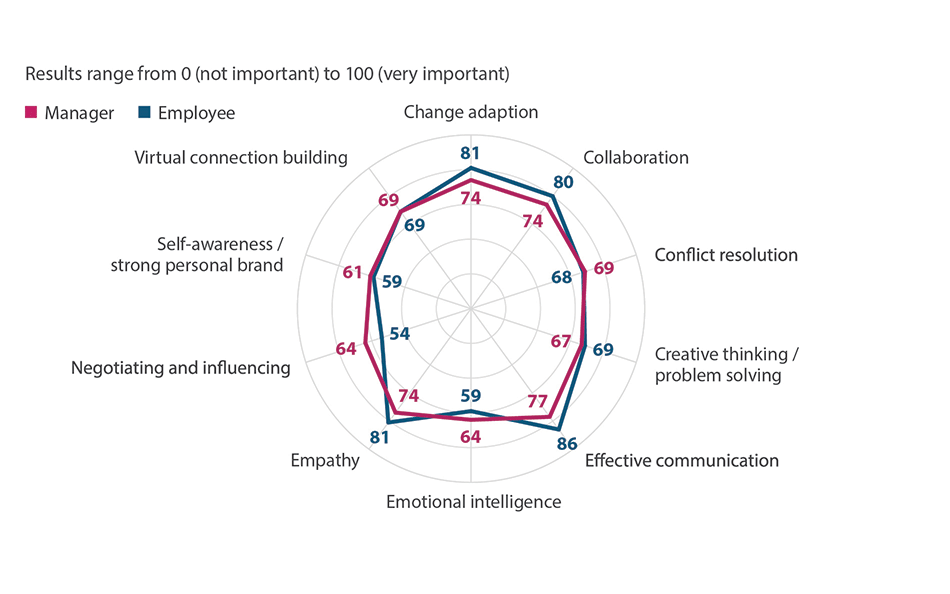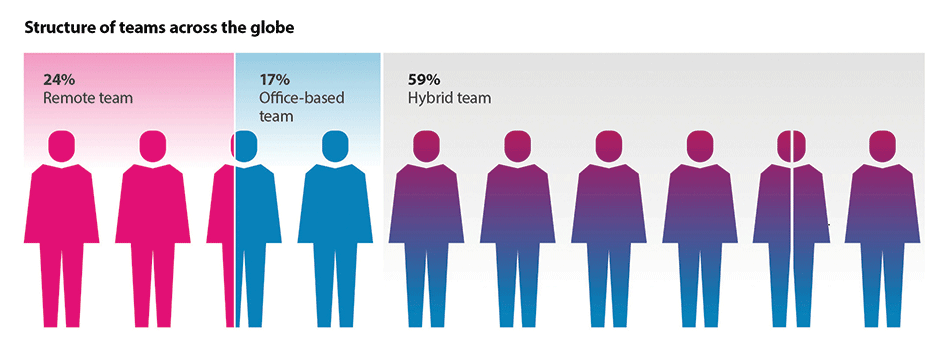By Véronique Rapetti From Insights Learning and Development
Hybrid working is here to stay. That much is clear but, given this new normal of the business world, what can business leaders – in all probability schooled in the environment of the “old normal” – do to facilitate successful outcomes for their organisations?
New research by Insights has confirmed that an overwhelming majority of global teams are now working hybrid – and that trend is here to stay. Our research asked 3,000 office workers across Europe and North America about their existing hybrid working arrangements, their preference for the future, and what they felt they needed to be successful.
Respondents noted that delivering objectives and learning and development activities were among the key aspects made easier since switching to hybrid. One-third of employees felt that they had more efficiency, creativity, and focus when working in a hybrid pattern (though, interestingly, far fewer managers felt that this was a benefit). Of course, for both managers and employees, the key benefit was reduced commuting time and the ability to manage time more flexibly.
 An astonishing 92 per cent of teams questioned are more hybrid than before the pandemic, with 72 per cent eager to maintain a hybrid arrangement into the future. My home country of France is embracing hybrid/remote work the most, at 76 per cent, with the UK slightly lower at 60 per cent. Globally, office-first is the least attractive option, with only 10 per cent preferring it, and that could also be seen as a deterrent for new recruits.
An astonishing 92 per cent of teams questioned are more hybrid than before the pandemic, with 72 per cent eager to maintain a hybrid arrangement into the future. My home country of France is embracing hybrid/remote work the most, at 76 per cent, with the UK slightly lower at 60 per cent. Globally, office-first is the least attractive option, with only 10 per cent preferring it, and that could also be seen as a deterrent for new recruits.
Our research is backed up by a recent Gallup study which found that 59 per cent of respondents preferred a hybrid arrangement, while only 9 per cent wanted to work from the office full time. Importantly, their research found that when employees who preferred a hybrid/fully remote option were forced to work from the office regularly, they experienced lower engagement and well-being, a higher intent to leave, and significantly higher levels of burnout.
Unfortunately, however, it’s not as simple as offering all employees the opportunity to work hybrid or fully remote. Almost every second employee who responded to our survey said that building relationships was now more difficult due to the “hybridisation” of their team. It was by far the most impacted aspect and, together with team connectivity, the only one with an evident negative development. Elsewhere, culture and identity were also identified as having been impacted by hybridisation.
So, what should every leader know about hybrid working and how they can contribute to successful outcomes? Here are a few things to ensure that you’re headed in the right direction.
Hybrid is here to stay
Despite some media stories about employees being forced back into the office, it is clear from our data that most employees have developed an affinity for hybrid working, feel that they are more productive working in a hybrid role, and want that pattern to remain. As a leader, you need to respond to this by asking what you can do to make hybrid work for your business and your people. This will certainly not be a “one size fits all”; of course, no two people are exactly the same, and we all come with our own needs, preferences, and expectations.
Importantly, make sure that hybrid is appropriate for the role and the person performing it. Where there are doubts, create a safe space to have an open and honest conversation with your employee and explore options and requirements. Agree steps and measurements and track against these to ensure that everyone is working towards the sought-after outcomes. Make sure that communication channels remain open throughout, so there are no surprises down the line.
The human touch is crucial
Forty per cent of global survey respondents said that a lack of social connection was a major challenge (55 per cent in Denmark and 45 per cent in Germany), with 29 per cent saying they struggled to establish relationships with colleagues (32 per cent in Germany). Sixteen per cent of global respondents said they struggled with feelings of loneliness (21 per cent in France and 18 per cent in Germany).
It might be surprising, then, that many global companies with hybrid teams are failing to invest in initiatives that could support the general health, lifestyle, and behaviours of employees. Managers must incorporate wellness initiatives that accommodate hybrid workplaces and flexible schedules.
Something we do at Insights to maintain the human touch is a “check-in” at the start of every meeting. This creates space for everyone to connect, to be authentic and vulnerable, and then focus on the meeting. We also encourage our people to take ownership of their own wellness, which includes supporting them to seek out activities and initiatives that support their physical fitness, mental health and well-being, nutrition, and lifestyle. We are working with a company that has an online platform for our employees to connect with various experts to support them in whatever challenge and wellness needs they may have (including nutritionists, executive coaches, counsellors, etc.). These are shared across our global community where appropriate to encourage others and cross-pollinate ideas.
Company culture must be a priority
We all know the famous quote by Peter Drucker: “Culture Eats Strategy For Breakfast.” Never before has the role of culture been so important in any organisation. As a leader, you need to ensure that you foster the right culture in your organisation. When the pandemic forced Insights’ employees to work remotely, we responded by holding more virtual meetings, encouraging people to practise “active listening”.
Our company experience was that being as human as you can, as often as you can, creates a powerful ripple effect that flows across an organisation, building mutual respect and understanding across all levels.
In addition, we recognise that being together in a social capacity is incredibly important to bring our culture to life. This is why last year we reopened our newly refurbished global campus in Dundee as a safe space for our people to collaborate – and importantly to enjoy one another’s company. While we allow our people to work with their managers to set a working pattern that works for them, we do encourage them to come in to work from the office regularly, as we recognise that the human connection provides a vital spark to ignite our organisation, which working remotely full time cannot always replicate. It’s that human touch … again!
Companies need to invest and train in technology

Our survey found that 36 per cent of global employees don’t use digital tools such as Slack, Teams, or Zoom to engage, and only 33 per cent used task management or collaboration tools to stay on top of projects. Instead, most continued to rely on more traditional communication channels such as email, telephone, or in-person meetings – risking isolating hybrid/remote employees.Organisations must adopt new communication methods that are more suited to hybrid working and ensure that everyone is skilled and confident in using them. The ability to successfully use the tools available to continue collaborating and innovating – regardless of working location – will be immensely valuable for everyone.
For example, Miro has been used successfully by our remote teams as an online “whiteboard” to share ideas or for mind mapping. Elsewhere, tools such as Monday.com can create workflow, increase visibility, and enable feedback about projects. Of course, with the introduction of any new technology, it’s incumbent upon leaders/managers to ensure that appropriate training and support is available.
Awareness is key
Only 20 per cent of global employees who responded to our survey are currently exploring team dynamics and company culture to improve team performance. This is despite our study’s finding that the most highly valued skills for hybrid employees/teams are:
- Effective communication (the number-one skill required for
- effective hybrid teamwork)
- Empathy
- Adapting to change
- Collaboration
- Conflict resolution
- Virtual connection building.
Exploring team dynamics, team effectiveness, and culture can help to improve not only connections, but also the interaction between and performance of hybrid employees, and their engagement. Our survey found that teams still feel they are lacking the deeper emotional connection that comes from social interaction and casual conversation. Ultimately, this connection is what builds a unified, engaged, and cohesive community, which is the foundation for longer-term innovation and business success.
At Insights, we use the Discovery awareness model to help people understand psychological type and develop the human skills needed to adapt and connect with others, improving relationships and achieving better outcomes and performances. Awareness of self helps you understand your strengths and weaknesses, where and how you can add most value, how to challenge appropriately, and how to turn your ideas into new realities. Taking the time to understand others – their strengths and weaknesses, likes and dislikes – helps you become more understanding and accepting of others, and able to adapt, connect, and collaborate more effectively to achieve better business outcomes.
We also use Discovery’s common language of colour to help make these preferences easier to understand and more memorable and give people the tools to talk about issues in a non-judgemental, non-confrontational way.
Hybrid teams are here to stay. These few things should help managers focus energy and resources in the right direction, ensuring that people are supported and enabled, and businesses are successful in the future world of work.
This article was originally published on 12 May 2023.
About the Author
 Véronique Rapetti is a trilingual, strategic and impact-focused learning and leadership professional, and is Product & Learner Experience Manager at Insights Learning and Development, a global leader in learning and development solutions.
Véronique Rapetti is a trilingual, strategic and impact-focused learning and leadership professional, and is Product & Learner Experience Manager at Insights Learning and Development, a global leader in learning and development solutions.
She has over 28 years of experience in learning and development, leadership entrepreneurship, strategic execution, and commercial focus. She is an advocate of, and strong believer in, empowering people and in the power of unlocking entrepreneurial skills and mindset to support personal and professional growth, innovation, and new thinking to solve problems.







![“Does Everyone Hear Me OK?”: How to Lead Virtual Teams Effectively iStock-1438575049 (1) [Converted]](https://www.europeanbusinessreview.com/wp-content/uploads/2024/11/iStock-1438575049-1-Converted-218x150.jpg)






























